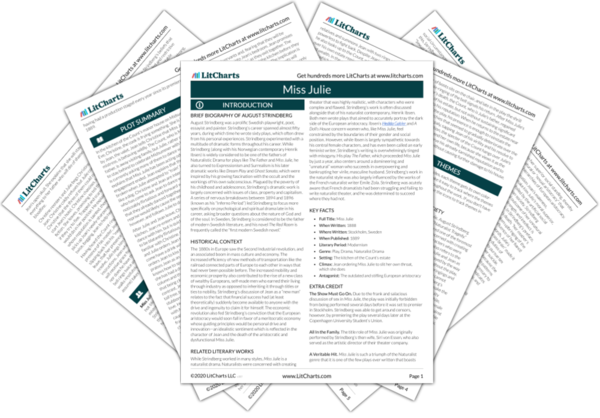Welcome to the LitCharts study guide on August Strindberg's Miss Julie. Created by the original team behind SparkNotes, LitCharts are the world's best literature guides.
Miss Julie: Introduction
Miss Julie: Plot Summary
Miss Julie: Detailed Summary & Analysis
Miss Julie: Themes
Miss Julie: Quotes
Miss Julie: Characters
Miss Julie: Symbols
Miss Julie: Theme Wheel
Brief Biography of August Strindberg

Historical Context of Miss Julie
Other Books Related to Miss Julie
Key Facts about Miss Julie
- Full Title: Miss Julie
- When Written: 1888
- Where Written: Stockholm, Sweden
- When Published: 1889
- Literary Period: Modernism
- Genre: Play, Drama, Naturalist Drama
- Setting: The kitchen of the Count’s estate
- Climax: Jean ordering Miss Julie to slit her own throat, which she does
- Antagonist: The outdated and stifling European aristocracy
Extra Credit for Miss Julie
The Show Must Go On. Due to the frank and salacious discussion of sex in Miss Julie, the play was initially forbidden from being performed several days before it was set to premier in Stockholm. Strindberg was able to get around censors, however, by premiering the play several days later at the Copenhagen University Student’s Union.
All In the Family. The title role of Miss Julie was originally performed by Strindberg’s then wife, Siri von Essen, who also served as the artistic director of their theater company.
A Veritable Hit. Miss Julie is such a triumph of the Naturalist genre that it is one of the few plays ever written that boasts having had a production staged every year since its premiere in 1889.







